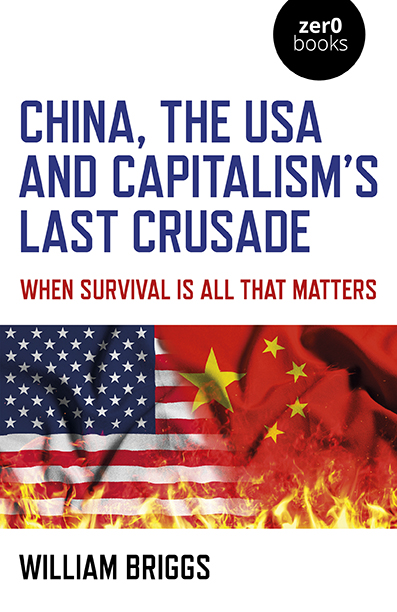China, the USA and Capitalism's Last Crusade
As the sun rises on China and sets on America, the world holds its breath.

As the sun rises on China and sets on America, the world holds its breath.
As the sun rises on China and sets on America, the world holds its breath.
Comparative politics, International relations (general), Political
As the sun rises on China and sets on America, the world holds its breath.
China, the USA and Capitalism's Last Crusade looks at the rise of China and the decline of the USA but from a different angle. William Briggs argues that this struggle for economic supremacy is being played out against a much bigger backdrop; the decline of the economic structure of capitalism. In this sense, the decline of the USA is portrayed as that larger economic decline in microcosm.
Briggs examines the relationship between state and capital, of how capitalism came to dominate the world, and of the historical, political and economic rise of both the USA and China. He shows that the struggle between the two nations has little to do with cultural, historical, demographic, political or ideological differences, but with what they have in common. Despite the portrayal of China as being ‘socialist’ it functions as a capitalist economy in the globalised capitalist world. While its journey to capitalism may have differed, the end point is the same and this is why there is such animosity, such conflict, such acrimony between the two states.
Click on the circles below to see more reviews
A book that anyone concerned about the human future would do well to read. Written lucidly and rich in its insights, it offers a distinctive interpretation of the US-China relationship, in many ways the defining relationship of our time. Though the two societies may have vastly different cultures and histories, William Briggs is at pains to show that both are set on a capitalist trajectory, and that neither the American neo-liberal or Chinese authoritarian model has much to commend it. These two capitalist titans, he tells us, are now locked in an increasingly turbulent relationship which, if mismanaged, could inflict immense devastation on an already deeply fractured world. His thought provoking yet dispassionate analysis is a welcome antidote to the now fashionable but highly dangerous sport of China bashing. ~ Professor Joseph Camilleri, Emeritus Professor of Politics at La Trobe University in Melbourne and one of Australia's leading International Relations scholars and authors.
We live in a precarious time. As insecurity, poverty, and inequality are growing, the world is engulfed by the antagonisms between capital and labor as well as between nation-states. Capitalism has brought the planet to the brink through climate change and pandemics. Briggs correctly argues that the rise of China has been based on a capitalist economic system. Rather than helping to resolve the world’s urgent problems, China’s challenge to the US hegemony brings the world closer to the dangerous interplay between two superpowers. Will the current historical era prove to be capitalism’s last crusade and what has to change to bring hope to the future? To understand these important questions, one has to read this book. ~ Professor Minqi Li, Professor Minqi Li, Department of Economics, University of Utah, author of The Rise of China and the Demise of the Capitalist World Economy 2015 Monthly Review Press
What I like about this book is that it looks at China, the United States and their relations through the lens of big-picture history. I like the way it considers not only countries, but more importantly economic and political systems. The role of capitalism in the rise of the American state is well known, and Briggs’s interpretation is well worth looking at. Even more interesting is his portrayal of contemporary China, which claims to be “socialism with Chinese characteristics”, as essentially a capitalist state in a globalised capitalist world. He contends, rightly in my view, that the “threats” are more against China than from it, the threatener being a state that sees its hegemony challenged by any rising power. We don’t know if it will lead to war, but we’d best watch out. The author is an extraordinarily prolific and capable author, who has written very widely on many topics relating to political theory and economy. This is an excellent account by somebody who really knows what he is talking about and provides an enlightening alternative to the heavily biased mainstream press. ~ Emeritus Professor Colin Mackerras, Foundation Professor Griffith University, School of Modern Asian Studies, Department of International Business and Asian Studies